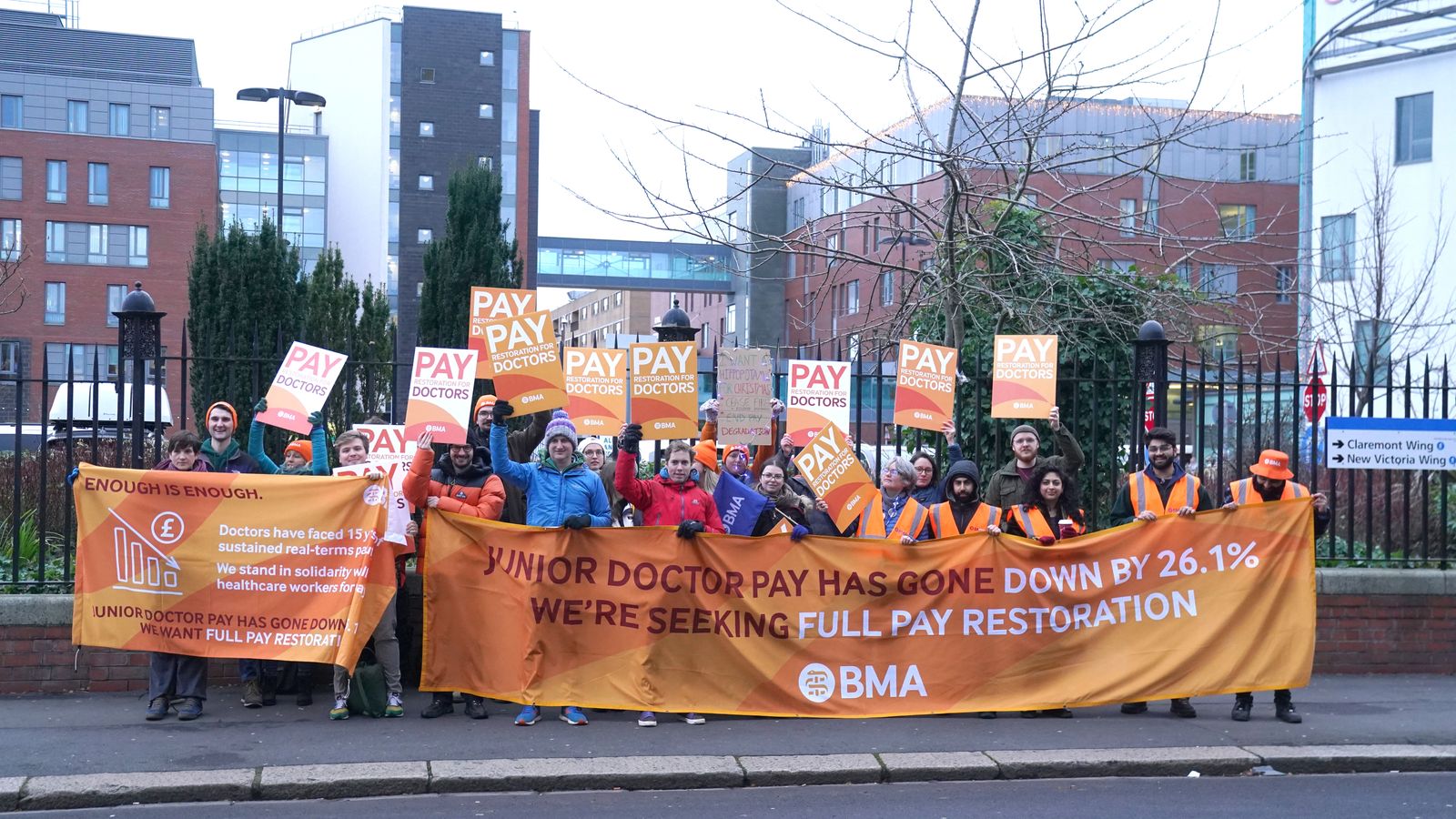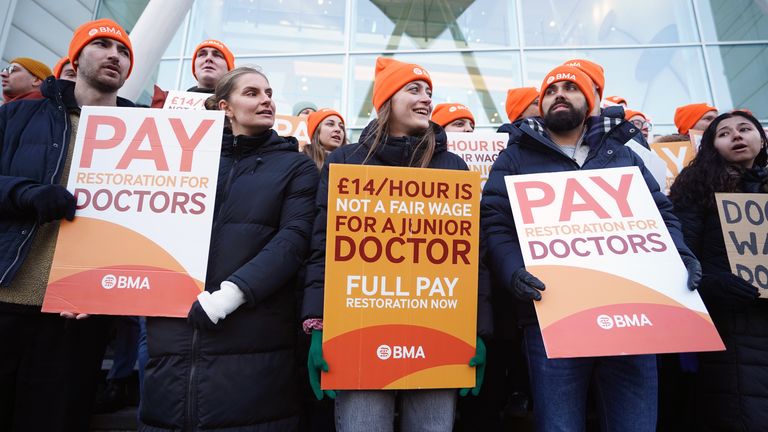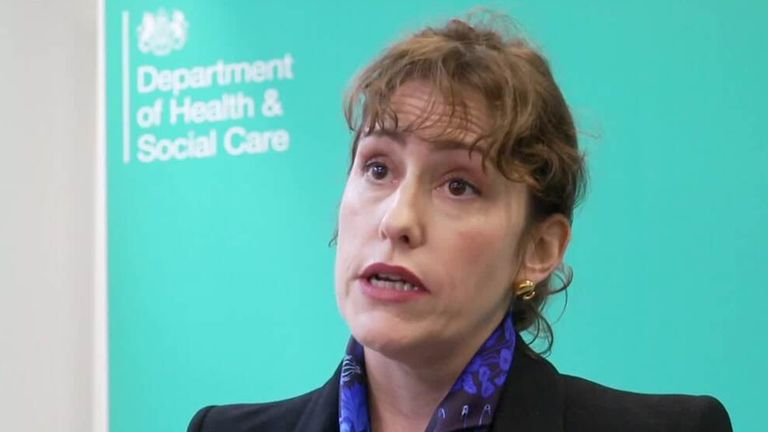Junior doctors in England are due to walk out for six days, starting on Wednesday morning.
The industrial action, from 7am on 3 January to 7am on 9 January, is the longest in the history of the NHS.
Health service executives have said the strike could mean “one of the most difficult starts to the year the NHS has ever faced”.
But the British Medical Association (BMA) has said it was forced to take action and reject the government’s December pay offer as it fails to compensate for real-terms pay cuts going as far back as 2008.
Here Sky News looks at why the strikes are happening and what both sides have said about them.
Who is striking?
The strikes only involve junior doctors in England. Under the NHS system, a junior doctor is any medical school graduate with between one and nine years’ experience.
They can be either members of the BMA or the Hospital Consultants and Specialists Association union.
NHS consultants took strike action in September and October and agreed to an extra 4.95% pay rise for senior doctors on top of the annual 6% increase already offered to them by the government.
This will be voted on by members of their union this month.
Medical students and staff who are not junior doctors are not legally allowed to join their colleagues on the picket line when scheduled to work.
But they can offer support and supplies when not on duty.
Junior doctors who work within the armed forces are also not permitted to take part.
What do junior doctors want?
The government gave junior doctors an 8.8% pay rise last summer, with an extra 3% offered during the last round of negotiations towards the end of the year.
The BMA said it rejected the 3% offer because it does not make up for a real-term pay cut of nearly a quarter for junior doctors since 2008.
Instead, they are calling for:
• Full pay “restoration” to reverse real-term cuts in pay since 2008/9;
• A new pay mechanism to prevent any future pay decreases against inflation and the cost of living;
• A reformed Doctors’ and Dentists’ Review Body for independent and fair pay recommendations for staff to “safeguard recruitment and retention of junior doctors”.
The BMA claims junior doctors in England were subjected to a 26.1% real terms pay cut between 2008 and 2022.
First-year doctors on 2016 contracts get paid £32,398 a year – while those on the previous 2002 contract earned £28,274, according to the BMA website.
And with 6.4 million patients on the waiting list for treatment, the union says staff are suffering burnout and leaving the country or the profession altogether.
They say the strikes are designed to “save the NHS” from conditions that put patient care at risk.
Why are these strikes significant?
Junior doctors also went on strike for three days between 20 and 23 December.
With this week’s round of action, it means there will have only been four weekdays unaffected by strikes or the Christmas holidays over a period of three weeks.
Gloucestershire Hospitals NHS Trust decided to close Cheltenham A&E during the last strike – and is doing the same between 8pm on 1 January and 8am on 9 January.
Figures released in September showed that rescheduled appointments due to strike actions by both junior doctors and consultants have now surpassed one million.
Read more from Sky News:
Hillwalker airlifted to hospital after falling 98ft
Man arrested over woman’s death on New Year’s Day
Downing Street insists it has cleared asylum backlog
NHS England’s national medical director, Professor Sir Stephen Powis, said the strikes will not only affect the health service this week – but also for “weeks after… as we recover services and deal with additional demand”.
He described them as having a “significant impact on almost all routine care”, with almost half of the medical workforce on picket lines.
Urgent care will be covered by non-striking, more senior staff, but routine appointments and operations are likely to be rescheduled.
What has the NHS said?
Julian Hartley, chief executive of NHS Providers, said hospital trusts are “worried” by the level of industrial action.
“It does mean that there will be a huge amount of concern around managing patient safety and quality during this period because urgent care will be the priority, but a lot of planned care will have to be rescheduled for later in the new year,” he said.
Professor Sir Stephen added: “Six consecutive days of industrial action comes at one of our busiest periods – the action will not only have an enormous impact on planned care, but comes on top of a host of seasonal pressures such as COVID, flu, and staff absences due to sickness – all of which is impacting on how patients flow through hospitals.
“Our colleagues across the health service are doing their very best for patients every day, with extensive preparations in place, but there’s no doubt they are starting 2024 on the back foot.”
He warned people to only use hospital services in emergencies – but said people must still call 999 or attend A&E if they are in genuine need.
What has the government said?
During the December strikes, Health and Care Secretary Victoria Atkins said she was prepared to return to the negotiating table if the strikes were called off.
On Tuesday, the prime minister’s spokesperson reiterated: “As the health and care secretary made clear, we are willing to have further discussions, but obviously the first thing to do is to stop striking.”
He added that the strikes are impacting the NHS’s ability to clear the waiting list backlog, with 88,000 appointments likely to be cancelled this time.
Click to subscribe to the Sky News Daily wherever you get your podcasts
The government wants a “fair resolution… for the taxpayer and hard-working doctors and health workers”, he said, adding: “It’s still very much in their gift to call off the strike action.”
Rishi Sunak told parliament last year the junior doctors’ strikes were “disappointing”.
He said: “We have now reached a resolution with every other part of the public sector and every other part of the NHS.
“And I’d also say that it was the junior doctors who received the biggest increase in their pay through the independent public standing pay review process of around a 10% increase for a typical junior doctor.”



